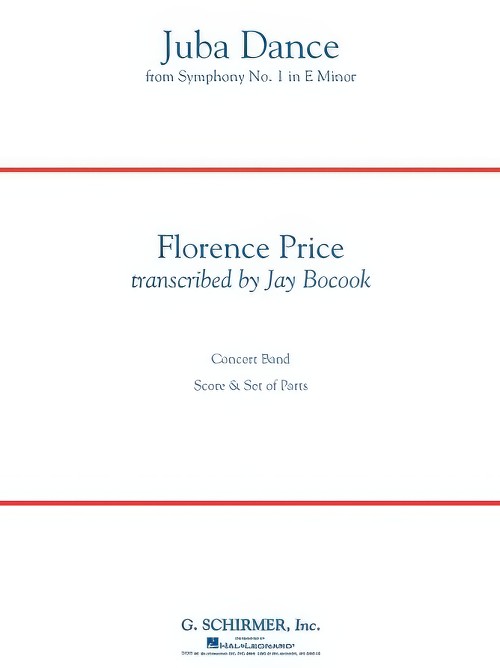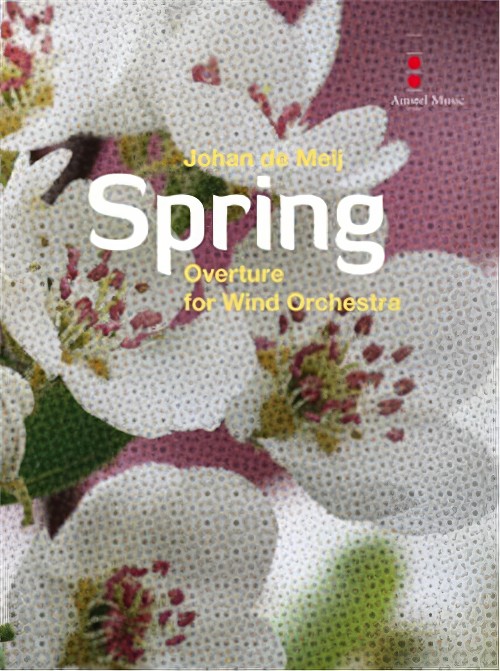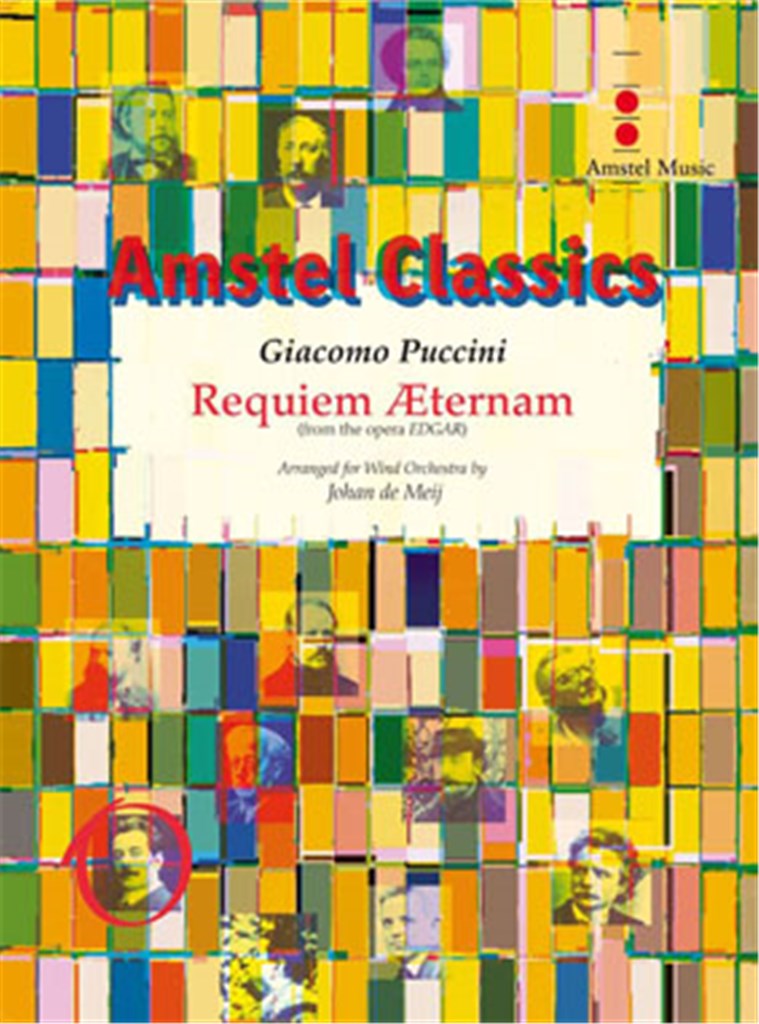Results
-
 £79.99
£79.99Juba Dance (from Sym. No. 1) - Florence Price
Florence Price (1887-1953) is noted as the first African-American female composer of symphonic works, and is only in recent years beginning to receive the recognition so richly deserved. Her Symphony No. 1 was completed in 1932 and first performed in 1933 by the Chicago Symphony Orchestra. Here is a sparkling transcription for band of the third movement (Juba Dance). (Grade 4) Dur: 3:50
Estimated dispatch 7-14 working days
-
 £79.99
£79.99Juba Dance (from Symphony No.1 in E minor) (Concert Band - Score and Parts) - Price, Florence - Bocook, Jay
Florence Price (1887-1953) is noted as the first African-American female composer of symphonic works, and is only in recent years beginning to receive the recognition so richly deserved. Her Symphony No. 1 was completed in 1932 and first performed in 1933 by the Chicago Symphony Orchestra. Here is a sparkling transcription for band of the third movement (Juba Dance). Duration: 3:45
Estimated dispatch 7-14 working days
-
 £57.50
£57.50Carrying You from "Laputa: Castle in the Sky" - Joe Hisaishi
New Sounds in Concert Band Series(NSB) for small band with 2-part choir Duration: approx.4'10" Arranged by Eiji Suzuki"Carrying You" was composed as a theme song to Castle in the Sky, an animated film produced by Studio Ghibli and directed by Hayao Miyazaki, released in 1986. The composer for Castle in the Sky was originally not Joe Hisaishi, but the director Miyazaki strongly requested him. The director told Hisaishi his vision for the film, and based on the world he imagined, Hisaishi made a collection of music called the Image Album. The melody that later becomes the basis for "Carrying You" was born from this album. However, the director Miyazaki was not planning on including a theme song in this film. Isao Takahata, the producer, proposed including a song, for the audience to think over the film at the end. He wanted the audience to think, "While the protagonists sought for the treasure, they didn't obtain any treasure. What did they obtain instead?" They thought, if they are going to create a theme song, it should be something organically connected with the entire film. Takahata requested the director Miyazaki to write the lyrics for the theme song. And to Hisaishi, he gave instructions to create a melody for the theme song using an instrumental piece called "Pazu and Sheeta" from the image album mentioned above. Director Miyazaki handed a piece of memo with lyrics to Takahata. "Carrying You" we hear now is this lyrics with some changes, set to Hisaishi's music. The melody is used at the opening of the film as well as the scene where Laputa is destroyed, and the song is used for the ending. Performance Advice from Arranger Suzuki: This is an extremely simple arrangement that can be performed by lower grade bands and singers. Of course, it can be played without singers and chorus, but the contents of the lyrics are very tasty so if possible, we recommend that you perform using the voices. Depending on your resources, the voice parts can be done as all solo, all female chorus, and so on.
Estimated dispatch 7-14 working days
-
£174.10
Besame mucho - Consuela Velasquez
Besame Mucho ("Kiss Me a Lot") is a song written in 1940 by female Mexican singer/composer Consuela Velasquez. Recently, it has been named the most popular Mexican song of all times.
Estimated dispatch 7-14 working days
-
 £68.99
£68.99Requiem Aeternam - Giacomo Puccini
Giacomo Puccini was commissioned to write a second opera after the resounding success of his first, Le Villi. However, the original four-act, grand opera Edgar, to a libretto by Ferdinando Fontana, received a rather lukewarm reception at its premire in La Scala in Milan in 1889 - initially, the work was only performed three times. Of all the planned performances in the subsequent two years, only one took place, in Lucca, Puccini's birthplace. There, the work was well received. Nevertheless, the composer decided to make drastic changes to Edgar the most radical being the reduction of the opera to three acts, as well as altering a few arias, charactersand instrumental parts. In its revised form, the work was even less popular than before. The discarded fourth act later provided material for Tosca (the duet Amoro sol' per te), but Puccini never felt the need to defend Edgar - as he did other less fortunate operas, such as La Rondine and Suor Angelica. On a piano excerpt for his female friend Sybil Seligman he even corrupted the title to 'E Dio ti GuARda da quest' opera' (may God preserve you from this opera). This did not prevent Arturo Toscanini performing the Requiem from the third act at Puccini's funeral in Milan Cathedral on 3 December 1924. The Requiem in the third act is being played when the long funeral procession carries the alleged body of Edgar - the confusedyoung man hesitating between the love of the virtuous Fidelia and the exotic Tigrana. The mass hails Edgar as a hero, but a monk claims that he has betrayed his country for a few gold pieces. When the soldiers try to desecrate the body, they discover that the armor contains none. The monk reveals himself as Edgar. He wants to leave with his faithful Fidelia, but the vengeful Tigrana stabs him and kills Fidelia. Edgar grieves over the lifeless body of his beloved, while Tigrana is arrested and the people submerge into prayer.
Estimated dispatch 7-14 working days
-
 £183.99
£183.99Spring - Johan de Meij
This overture recounts the magical re-awakening of Spring's arrival in Sweden with the help of two Swedish folk songs. A melancholic, haunting song is first heard from afar as various instruments from different locations in the concert hall echo the solitary female voice. A soulful melody gradually transforms to a polka-like variant that gradually builds into the joyful main theme. The score contains valuable notes from the composer on how various effects and placement of musicians throughout the space can enhance Spring's performance.
Estimated dispatch 7-14 working days
-
 £94.99
£94.99Gaudete!
'Gaudete' comes from the Finnish/Swedish 'Piae Cantiones', a collection of religious music from the 16th century. The English folk group 'Steeleye Span' featuring female lead singer Maddy Prior had a hit with this song in the seventies. Peter Martin made a scintillating arrangement for wind-band. By the use of fourths and thirds in the melody the composer harks back to the period from which the song originated (The Middle Ages)
Estimated dispatch 7-14 working days
-
 £180.00
£180.00Spring (Concert Band - Score and Parts) - De Meij, Johan
This overture recounts the magical re-awakening of Spring's arrival in Sweden with the help of two Swedish folk songs. A melancholic, haunting song is first heard from afar as various instruments from different locations in the concert hall echo the solitary female voice. A soulful melody gradually transforms to a polka-like variant that gradually builds into the joyful main theme. The score contains valuable notes from the composer on how various effects and placement of musicians throughout the space can enhance Spring's performance. Duration: 10.45
Estimated dispatch 7-14 working days
-
 £68.00
£68.00Requiem Aeternam (from Edgar) (Concert Band - Score and Parts) - Puccini, Giacomo - De Meij, Johan
Giacomo Puccini was commissioned to write a second opera after the resounding success of his first, Le Villi. However, the original four-act, grand opera Edgar, to a libretto by Ferdinando Fontana, received a rather lukewarm reception at its premiere in La Scala in Milan in 1889. Initially, the work was only performed three times. Of all the planned performances in the subsequent two years, only one took place, in Lucca, Puccini's birthplace. There, the work was well received. Nevertheless, the composer decided to make drastic changes to Edgar the most radical being the reduction of the opera to three acts, as well as altering a few arias, characters and instrumental parts. In its revised form, the work was even less popular than before. The discarded fourth act later provided material for Tosca (the duet Amoro sol' per te), but Puccini never felt the need to defend Edgar as he did other less fortunate operas, such as La Rondine and Suor Angelica. On a piano excerpt for his female friend Sybil Seligman he even corrupted the title to 'E Dio ti Guarda da quest' opera' (may God preserve you from this opera). This did not prevent Arturo Toscanini performing the Requiem from the third act at Puccini's funeral in Milan Cathedral on 3 December 1924. The Requiem in the third act is being played when the long funeral procession carries the alleged body of Edgar, the confused young man hesitating between the love of the virtuous Fidelia and the exotic Tigrana. The mass hails Edgar as a hero, but a monk claims that he has betrayed his country for a few gold pieces. When the soldiers try to desecrate the body, they discover that the armor contains none. The monk reveals himself as Edgar. He wants to leave with his faithful Fidelia, but the vengeful Tigrana stabs him and kills Fidelia. Edgar grieves over the lifeless body of his beloved, while Tigrana is arrested and the people submerge into prayer. Duration: 3.30
Estimated dispatch 7-14 working days
-
£94.99
Gaudete! Wind Band Set (Score & Parts)
Gaudete' comes from the Finnish/Swedish 'Piae Cantiones', a collection of religious music from the 16th century. The English folk group 'Steeleye Span' featuring female lead singer Maddy Prior had a hit with this song in the seventies. Peter Martin made a scintillating arrangement for wind-band. By the use of fourths and thirds in the melody the composer harks back to the period from which the song originated (The Middle Ages) 03:30
Estimated dispatch 7-14 working days
